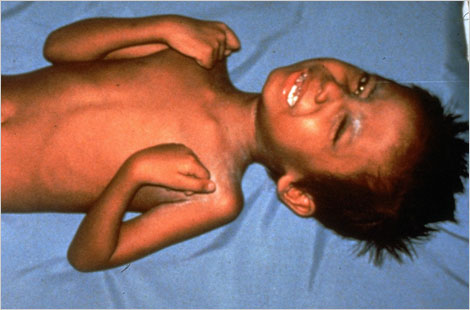Tetanus

What is Tetanus?
Tetanus, also known as lockjaw, is a serious bacterial infection caused by the bacterium Clostridium tetani. The bacteria can enter the body through a wound or injury and release toxins that affect the nervous system. Tetanus is characterized by muscle stiffness and spasms, particularly in the jaw and neck muscles, which can lead to difficulties in breathing, swallowing, and opening the mouth.
Who's at risk for Tetanus?
Anyone can be at risk of developing tetanus if they have a wound or injury that allows the bacteria to enter the body. However, individuals who have not received the tetanus vaccine or who have not kept up with their booster shots are at a higher risk. Tetanus is more commonly observed in older adults, individuals who work in agriculture or construction where exposure to soil and dirt is common, and those living in areas with limited access to healthcare and immunization programs.
What causes Tetanus?
Tetanus is caused by the bacteria Clostridium tetani, which is commonly found in soil, dust, and animal feces. The bacteria can enter the body through deep puncture wounds, burns, surgical wounds, or any other type of injury where the skin is broken. Once inside the body, the bacteria multiply and produce toxins that affect the nervous system, leading to the characteristic symptoms of tetanus.
How does Tetanus start?
Tetanus typically begins when the bacterium Clostridium tetani enters the body through a wound or injury. The bacteria spores can survive in the environment, such as soil or dust, for a long time. Once inside the body, the bacteria multiply and release toxins that interfere with the normal functioning of the nervous system. The toxins bind to nerve endings and block the release of certain neurotransmitters, leading to muscle stiffness and spasms characteristic of tetanus.
What are the symptoms of Tetanus?
The symptoms of tetanus usually develop within a few days to several weeks after the bacteria enter the body. Common symptoms include muscle stiffness and spasms, particularly in the jaw muscles, giving rise to the characteristic "lockjaw" appearance. Other symptoms may include stiffness and spasms in the neck, difficulty swallowing, muscle rigidity and stiffness in other parts of the body, fever, sweating, elevated heart rate, and high blood pressure. Severe cases of tetanus can cause breathing difficulties and even lead to life-threatening complications.
How is Tetanus diagnosed?
The diagnosis of tetanus is primarily based on clinical symptoms and a thorough evaluation of the individual's medical history, particularly regarding recent injuries or wounds. Laboratory tests are typically not used to diagnose tetanus, as the presence of Clostridium tetani bacteria may not be detectable in blood or wound cultures. However, these tests may be conducted to rule out other potential infections or to confirm the presence of the bacteria in rare cases.
How can Tetanus be treated?
Treatment of tetanus involves a combination of interventions aimed at controlling symptoms, preventing complications, and eliminating the bacteria from the body. Immediate medical attention is crucial. The individual may be given tetanus immune globulin (TIG), which contains antibodies to neutralize the toxin produced by the bacteria. Antibiotics, such as metronidazole or penicillin, may be administered to eliminate the bacteria. Treatment also includes wound care, pain management, muscle relaxants to alleviate muscle spasms, and supportive measures such as respiratory support if necessary.
What complications may occur with Tetanus?
Tetanus can lead to severe complications, especially if left untreated or if treatment is delayed. The muscle stiffness and spasms can become severe, affecting the muscles involved in breathing and swallowing. This can lead to respiratory problems, aspiration pneumonia due to difficulty swallowing, and even respiratory failure. Other complications may include fractures or injuries caused by severe muscle contractions, blood clots, and cardiac arrhythmias. Prompt medical attention is essential to minimize the risk of complications.
How can I prevent Tetanus?
Tetanus can be prevented through immunization. The tetanus vaccine, often combined with diphtheria and pertussis vaccines (Tdap or DTaP), is routinely given to children and adults as part of the recommended vaccination schedule. Regular booster shots are necessary to maintain immunity, typically every 10 years. It is essential to seek medical attention for any deep or dirty wounds, and a tetanus booster may be recommended depending on the individual's vaccination history and the nature of the injury.
Long-term management of Tetanus
Long-term management of tetanus focuses on supportive care, wound management, and rehabilitation. This includes wound cleaning, dressing, and monitoring to prevent further infection. Physical therapy and occupational therapy may be necessary to help regain muscle strength, coordination, and mobility after the acute phase of the illness. Follow-up appointments with healthcare providers are important to monitor progress, address any ongoing symptoms or complications, and ensure that immunization status is up to date.
What is recent research saying about Tetanus?
Recent research on tetanus has focused on improving vaccination strategies, understanding the pathogenesis of the disease, and exploring novel treatment approaches. Studies have investigated the use of newer vaccines and different vaccine delivery methods to enhance immunization coverage and effectiveness. Research efforts are also directed towards understanding the mechanisms by which the toxins produced by Clostridium tetani affect the nervous system, which may contribute to the development of new therapeutic targets. Additionally, ongoing studies aim to improve wound management techniques and explore potential adjunctive therapies to enhance the treatment outcomes for tetanus.
Where can I go for more information on Tetanus?
For more information on tetanus, reliable sources such as the Centers for Disease Control and Prevention (CDC), World Health Organization (WHO), or the National Health Service (NHS) can provide valuable information. These organizations offer resources on tetanus, including prevention guidelines, vaccination schedules, and detailed information on symptoms, diagnosis, and treatment. Local healthcare providers, public health departments, and immunization clinics can also serve as important sources of information and guidance specific to the region.

